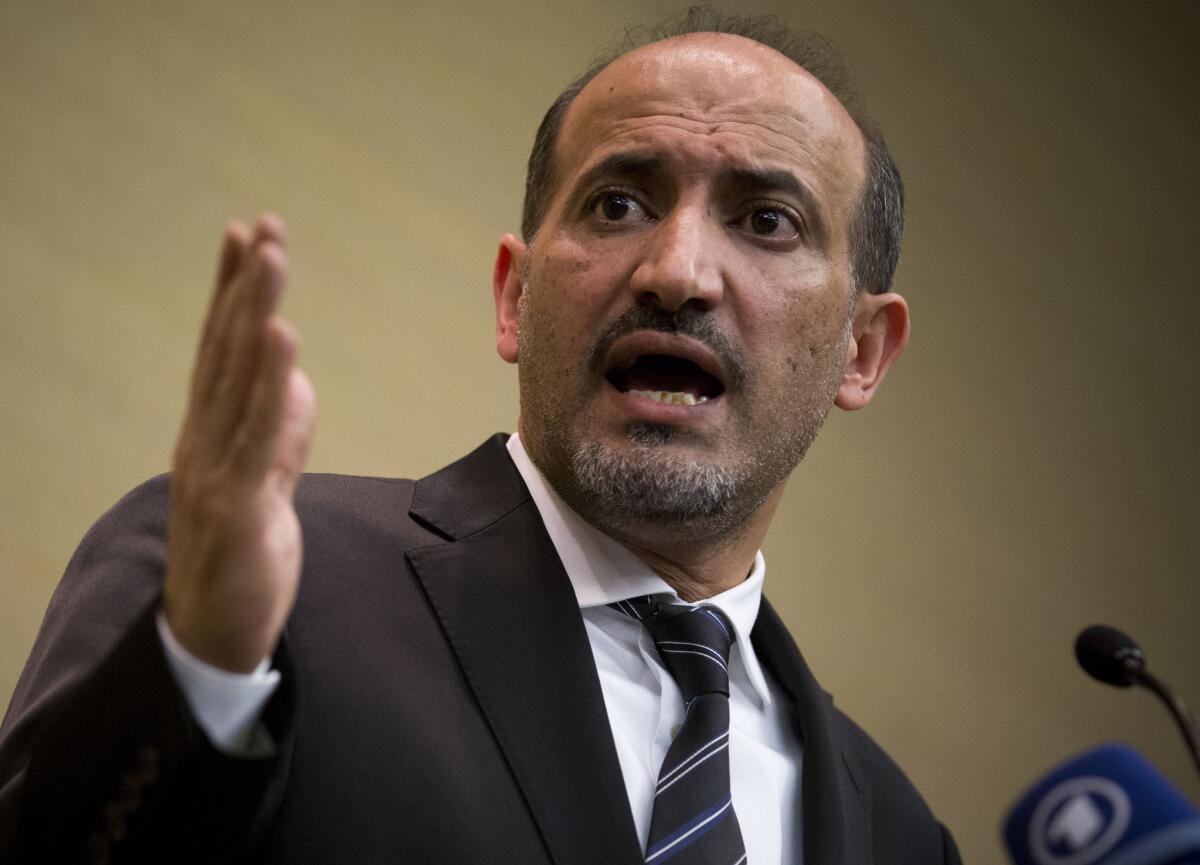Syrian officials and opposition to meet at Geneva peace talks

- Share via
GENEVA – Syrian government officials and members of the U.S.-backed opposition are expected to meet Friday in their first face-to-face negotiations since civil war broke out almost three years ago.
The venue for the long-anticipated peace talks in Switzerland moved to Geneva after a ceremonial opening Wednesday in the resort town of Montreux, on the other end of Lake Geneva.
United Nations officials organizing the conference planned to talk to both the government and opposition Thursday to devise a procedure for Friday’s talks amid the prevailing ill will. Representatives of the United States and Russia — major backers of the Syrian opposition and the Syrian government, respectively — are expected to be in regular contact with their allies during the talks.
Few were optimistic about a major breakthrough to resolve the conflict, which has left tens of thousands dead and spread instability throughout the Middle East.
“We have no illusions that it is going to be easy,” Lakhdar Brahimi, the U.N. and Arab League special envoy for Syria, told reporters in Montreux. “But we are going to try very hard.”
Observers said the talks could last weeks if not months, with this first round likely to stretch into next week.
The United Nations has had relatively little time to prepare for the negotiations. The participation of the deeply divided opposition was not confirmed until Saturday. The Syrian National Coalition, the major opposition group, agreed to send a delegation to Switzerland, but the bloc is mostly an exile-based faction with limited representation in Syria and little leverage with rebel fighters.
“Our original idea was that we would have the delegations nominated before the end of December,” Brahimi said. ”That would have given us three weeks to talk to them, find out exactly what ... their thinking was, share with them our own thinking. Unfortunately, this has not happened.”
U.N. officials were trying to determine the best format for the sensitive talks amid the mutual acrimony. Putting both sides in the same room to kick things off could be problematic.
“I am going to meet them separately and see how best we can move,” said Brahimi, a veteran Algerian diplomat who has been involved in peace efforts involving conflicts in Lebanon and Afghanistan. “Do we go straight on Friday into one room and start discussing? Or do we talk a little bit more separately? I don’t know yet. What we will try to do is talk about how to end this bloody war.”
On Wednesday, a series of polemical broadsides emanating from the government and opposition delegations illustrated the barriers in reaching an accord. Diplomats cautioned that the caustic public statements did not necessarily rule out substantive negotiations behind closed doors.
A major issue is the future of Syrian President Bashar Assad, whose family has ruled the country for more than four decades.
The opposition and its U.S. patrons insist Assad must go. But Syrian authorities say that only the Syrian people can make that decision. Whether a compromise on that central issue is possible isn’t clear.
With major advances unlikely, officials are pushing for some confidence-building measures, such as agreements for localized truces, prisoner exchanges and expanded humanitarian aid for besieged communities.
U.S. Secretary of State John F. Kerry also sought to downplay any expectations of a quick resolution. Kerry, who initially achieved public acclaim as a dissident veteran of the Vietnam War, recalled how, a generation ago, U.S. and Vietnamese delegates spent months debating the shape of the table for peace negotiations that were eventually held in Paris.
“Look, negotiations to end wars, particularly complicated, difficult confrontations and conflicts like this, sometimes take a long time,” he told reporters in Switzerland.
Twitter: @mcdneville
More to Read
Sign up for Essential California
The most important California stories and recommendations in your inbox every morning.
You may occasionally receive promotional content from the Los Angeles Times.










